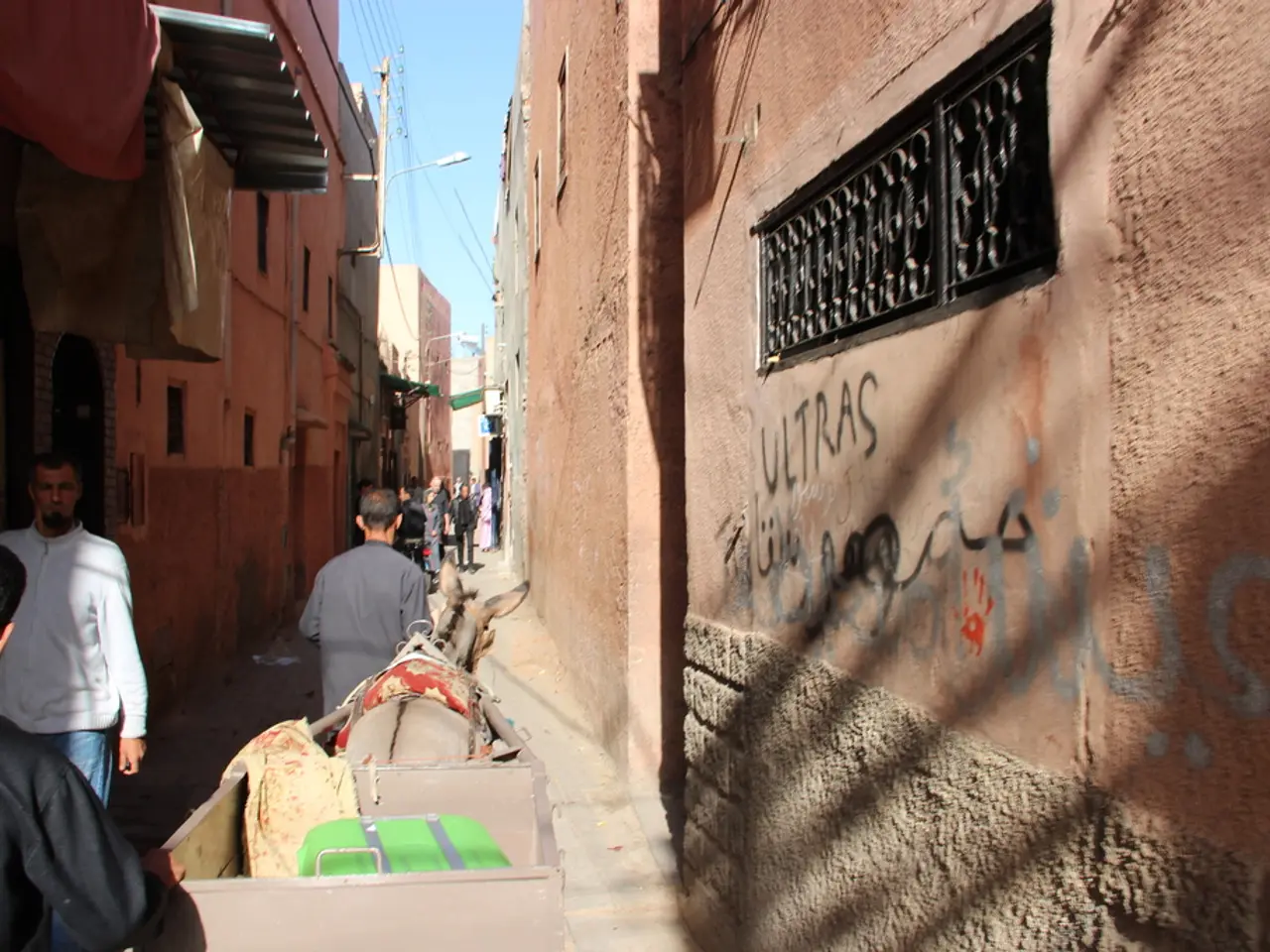Escalating global scrutiny towards Israel's proposed military operation in Gaza
Israel's proposed expansion of military operations in Gaza, specifically the planned takeover of Gaza City, has sparked widespread criticism and concern from the international community. The planned offensive has been met with condemnation due to its potential humanitarian and geopolitical consequences.
The United Nations (UN) has been one of the most vocal critics. UN High Commissioner for Human Rights, Volker Turk, has strongly condemned the plan and called for an immediate halt to the offensive. He warned that the escalation would lead to "more killing, more unbearable suffering, senseless destruction," and massive forced displacement of civilians. Turk emphasized that Israel's plan contradicts international law and previous International Court of Justice rulings that call for an end to occupation and respect for Palestinian self-determination [1][2].
The European Union (EU) has also expressed concern, urging Israel to reconsider its military expansion. EU Council President Antonio Costa highlighted that the offensive would worsen the humanitarian crisis, violate international agreements, and undermine fundamental principles of international law. The EU also raised issues such as the blockade of humanitarian aid and the illegal expansion of settlements as interconnected concerns [1].
The United States has responded more cautiously. A U.S. State Department spokesperson indicated uncertainty around the actual implementation of the expansion, focusing on freeing hostages and preventing Hamas from ruling Gaza again without directly condemning or endorsing the planned takeover [1].
Saudi Arabia has expressed deep concern, viewing Israel's military escalation as counter to regional stability and Saudi interests. While Saudi Arabia shares an interest in neutralizing groups like Hamas, it disagrees with Israel’s methods and has seen the military approach slow diplomatic normalization efforts. Saudi officials emphasize the need for a political settlement and express frustration over Israel's unilateral military expansion and lack of a shared strategic vision for Gaza [3].
At a UN Security Council emergency session, a senior UN official warned that Israel's plan risks "igniting another horrific chapter" in the conflict. The plan involves disarming Hamas, taking control of Gaza City, and establishing an alternative civilian administration, which could lead to the displacement of up to 800,000 people and a prolonged military siege lasting several months [2].
The proposed offensive has drawn sharp criticism from international leaders, military officials, and families of hostages still held by Hamas. The plan requires the mobilization of thousands of reservists, but the timeline for this operation remains unclear. No specific country has stated support for Israel's proposed offensive, and growing concerns that further escalation will deepen the humanitarian crisis in Gaza persist.
China's foreign ministry has reiterated that "Gaza belongs to the Palestinian people" and called for an immediate ceasefire. Germany's Chancellor Friedrich Merz has announced a halt to arms exports to Israel that could be used in Gaza, while UK Prime Minister Keir Starmer has called the decision to halt arms exports "wrong." However, Dutch Foreign Minister Caspar Veldkamp stated that the halt in arms exports would "not help to get the hostages home."
In summary, the international community, led by the UN and the EU, strongly opposes Israel's planned Gaza City military offensive due to its catastrophic humanitarian impact and violation of international legal standards, while the US response remains guarded, and Saudi Arabia is concerned about regional instability caused by the military escalation [1][2][3]. No specific country has announced sanctions against Israel for its proposed offensive, and no specific country has announced the resumption of arms exports to Israel. The proposed offensive may lead to Israel's diplomatic isolation.
[1] Reuters. (2023, March 15). International community criticizes Israel's Gaza City military offensive plan. Retrieved March 16, 2023, from https://www.reuters.com/world/middle-east/international-community-criticizes-israels-gaza-city-military-offensive-plan-2023-03-15/
[2] Al Jazeera. (2023, March 16). UN warns of 'horrific chapter' in Gaza conflict as Israel plans offensive. Retrieved March 16, 2023, from https://www.aljazeera.com/news/2023/3/16/un-warns-of-horrific-chapter-in-gaza-conflict-as-israel-plans-offensive
[3] Haaretz. (2023, March 15). Saudi Arabia expresses deep concern over Israel's military escalation in Gaza. Retrieved March 16, 2023, from https://www.haaretz.com/middle-east-news/saudi-arabia-expresses-deep-concern-over-israels-military-escalation-in-gaza-1.100881563
- The United Nations (UN) and the European Union (EU) have firmly criticized Israel's proposed offensive in Gaza, with UN High Commissioner for Human Rights, Volker Turk, and EU Council President Antonio Costa expressing concerns about the potential humanitarian crisis, violation of international law, and regional instability.
- As the international community, led by the UN and EU, strongly opposes Israel's proposed military offensive in Gaza due to its catastrophic humanitarian impact and violation of international legal standards, the United States response remains guarded, and Saudi Arabia is concerned about regional instability caused by the military escalation.







